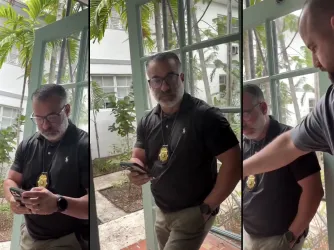Table of Contents
Rosenberger Run Amok?
An article in the March 14 edition of Inside Higher Ed entitled “A More Porous Church-State Wall” discusses the legacy of the Supreme Court’s 1995 decision in Rosenberger v. Rector and Visitors of the University of Virginia (Rosenberger), focusing on several recent court decisions in that area. In Rosenberger, the Supreme Court determined that the University of Virginia could not deny funding to a Christian student newspaper merely because it engaged in religious activities. The premise of the IHE article seems to be that Rosenberger’s legacy is just beginning to be felt and that as a result, the “wall” between church and state on campus is beginning to crumble. Of course, the existence as well as the utility of such a “wall” has been a hot topic of debate for decades and is likely to remain so. Yet in reading the article, I was struck by a particularly ugly assumption that appears to have been made by those who advocate for less religious freedom on campus—that for some reason, it is both beneficial to students and morally acceptable that religious expression should find official disfavor on public college campuses.
First, let’s take a look at what the Supreme Court had to say about that in Rosenberger. The IHE article states:
The majority decision in the case came down squarely on the side that this was a free speech issue. “Were the prohibition applied with much vigor at all, it would bar funding of essays by hypothetical student contributors named Plato, Spinoza, and Descartes. And if the regulation covers, as the university says it does, those student journalistic efforts which primarily manifest or promote a belief that there is no deity and no ultimate reality, then undergraduates named Karl Marx, Bertrand Russell, and Jean-Paul Sartre would likewise have some of their major essays excluded from student publications,” the ruling said.
This is a point that is very hard to counter. Throughout most of human history, the quest for knowledge has been intertwined with religious belief (or a sworn lack thereof)—and there’s really no reason to suppose that this will ever change. Yet Barry Lynn, the leader of Americans United for the Separation of Church and State, apparently doesn’t hold with this thinking. His group is described as being “horrified” at the Rosenberger decision, and he opines:
“I still think religion is different,” he said. “Rosenberger was a fundamental misunderstanding of the Constitution. The framers wanted religion treated differently.” Lynn stressed that this was not an anti-religious view. He said that the Constitution granted wide freedom to religious groups to be treated with “kid gloves” on many government matters, so, for example, government agencies shouldn’t try to impose their rules on religious colleges and other institutions. But such religious groups “have to support themselves” to keep an appropriate separation.
Lynn’s evidence that “[t]he framers wanted religion treated differently” is not cited in the article, and is probably in any case too long to discuss in a news publication. Yet in order to adhere to this belief in the context of student publications, one must accept two premises that are not particularly friendly to liberty.
The first premise is that religious expression is of lower value than expression of, well, virtually any other kind (child pornography, threats, and other usual things excepted, of course). Without Rosenberger, students would still be free to argue any number of controversial things, such as politics, war, economics, and even moral issues. Yet injecting religious belief into any of these arguments (and it is commonly present in all of those arguments) could instantly render them unsuitable for a student fee-funded publication, depending on the policies of the state university in question. In other words, opposing the Iraq War in a student newspaper out of concern for civilian casualties would be acceptable, while opposing it because of Jesus’s admonition to “turn the other cheek” could be forbidden. Supporting social welfare programs in an effort to “clean up the streets” would be unexceptionable, while supporting them because of a concern for Christian charity could be forbidden. And, as the Court pointed out, making political arguments based on atheism would also be forbidden. This would go very far towards insuring that political discourse on campus would look nothing like political discourse in America at large; I just can’t think of any reason why a free society would want that to happen.
The second premise one must accept to believe that religious speech should be able to be banned from student fee-funded publications is that universities are capable of and competent to determine what is religious speech (or atheistic speech) and what is not. In fact, student fee decisions are usually made by student governments, so it would probably be uninformed students making that call. What are such people to make of arguments based on the existence of a God-free, mechanistic universe? What about those agnostics who wish to write about their struggles with religious beliefs? Or those who believe in the healing powers of crystals? There is even a religion, Scientology, which relies on beliefs not in the supernatural but in aliens with advanced powers. Presumably, aliens would be fair game to discuss under a Rosenberger-free regime. Would that make Scientology the only religion that could be discussed in your average campus newspaper? Are we comfortable with students drawing these distinctions? At San Francisco State University, administrators can’t even figure out that if you can burn the American flag, you can surely stomp on the flags of Hamas and Hezbollah. Are they, now, to determine what is religious and what is not?
This is the peril of creating types of expression that are disfavored. Even child pornography, a form of expression disfavored by just about everyone, is the subject of constant litigation to determine just what is lawful. Is this really the fate that those who do not believe in the principles of Rosenberger would wish upon us? Those who believe that Rosenberger has, in Barry Lynn’s words, “run amok,” should consider this before they put their stamp of approval on those who wish to silence campus discussion of perhaps the oldest field of human knowledge and endeavor.
Recent Articles
Get the latest free speech news and analysis from FIRE.

Can Congress subpoena a journalist for reporting a Delta Force commander’s name?

Why are Miami police questioning a woman over Facebook posts?

No, you can’t make students stand for the Pledge of Allegiance
